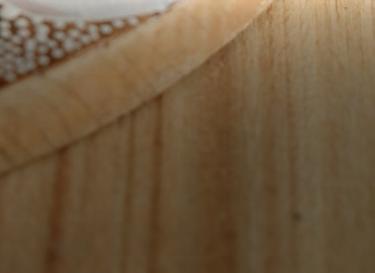
11 minute read
A FEAST FOR THE SOUL
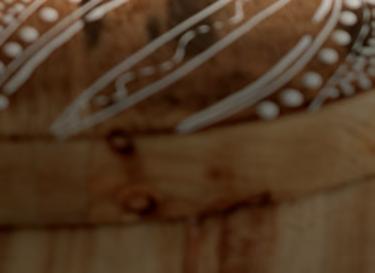
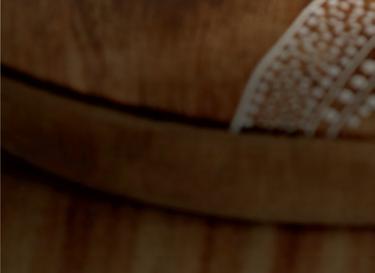
Advertisement
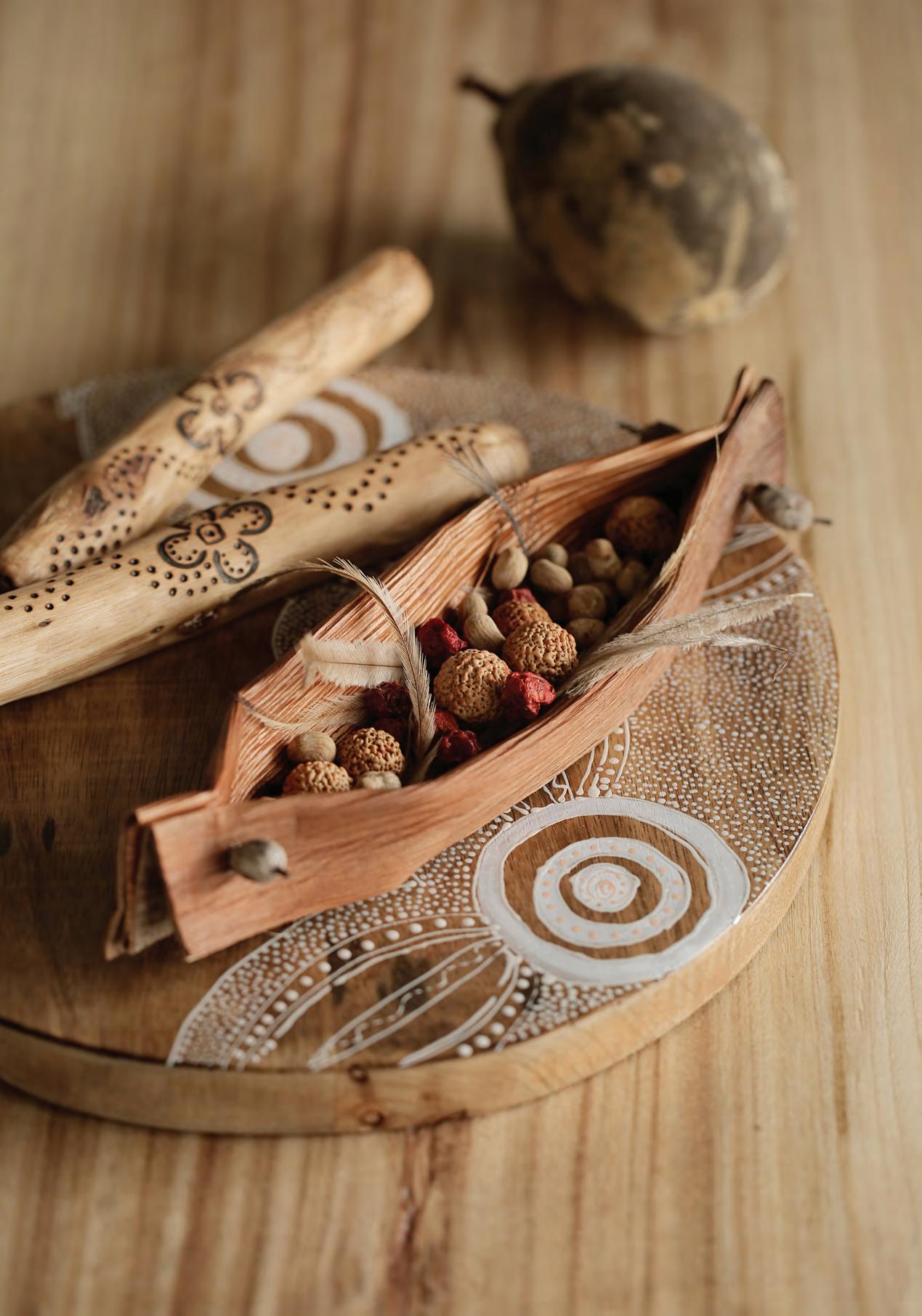
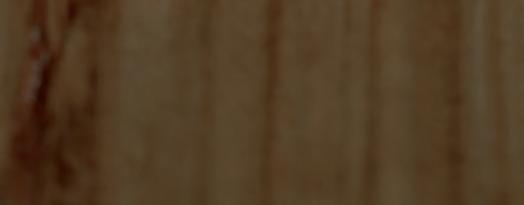
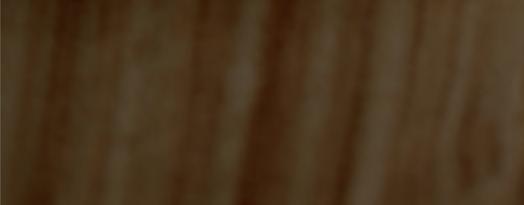
WORDS CANDICE HOLZNAGEL
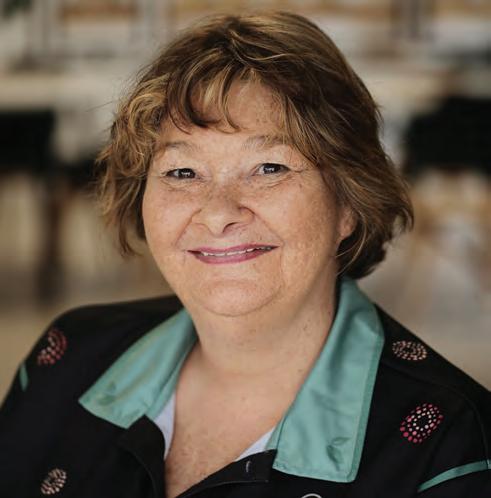
DALE CHAPMAN LIVES in a world of taste, texture and tradition.
This proud Indigenous elder feels the beating heart of this beautiful country and senses the spiritual connection to the land, the rivers, the mountains and sea. Aunty Dale is innately aware of the rich soil beneath her feet, of the rain that falls from our skies and of the Mother Sun, all of which work together to nourish the native Country.
Born in Dirranbandi in southwest Queensland on Yuwaalaraay and Kooma tribal lands, her father was a proud Aboriginal man.
“We grew up all over the place,” she says. “My father was a drover and we moved around quite a lot. I went to 13 different schools before the end of grade seven. You’d just settle in, fi nd friends and then move again. My sisters became my friends. We were a very tight network.”
Despite the constant upheaval, even as a child she never doubted for a second who she was. “I’m an Australian Indigenous woman. That’s my history.”
The pride radiates from her entire being, from deep within her dark eyes to the self-assured tone of her voice.
“My mum was mainly the person who instilled this in us,” Aunty Dale continues. “She told us to never ever forget we are Indigenous. We are pale and we could have gone off into another direction, an easier direction, but at no time did we sway.
“We were always proud of who we were. We would stand up for the rights of not just Indigenous kids, but all kids in the playground who were bullied and had hassles. It’s just how we were brought up.”
Those early formative years, living freely in the Australian bush, undoubtedly shaped her future. “We grew up just like any other family. Running wild. Dealing with the land, doing what we had to do to survive.”
This meant scouring the bush for native fruits and plants. For Aunty Dale, the scent, texture and colours of these plants form the rich tapestry of her life. “Let’s face it, bushfood was my birthright.”
Today, she is an award-winning chef, highly regarded as
Dale Chapman PHOTO: Anastasia Kariofyllidis

Fabrics ~ Wallpaper ~ Furniture ~ Window Coverings
T H E E L E P H A N T R O O M
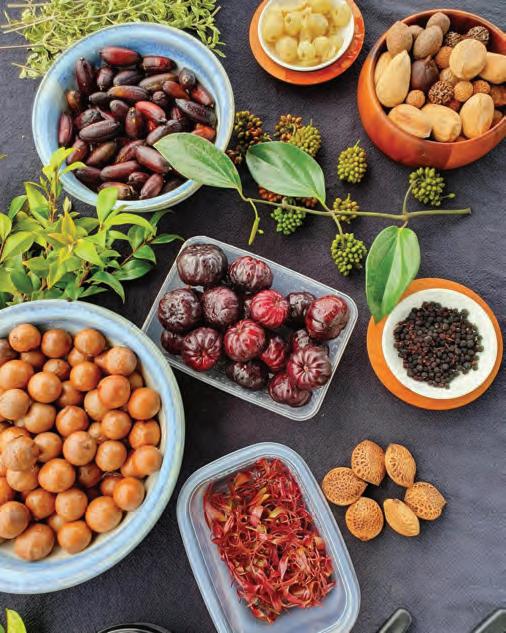
Witjuti Grub Nursery
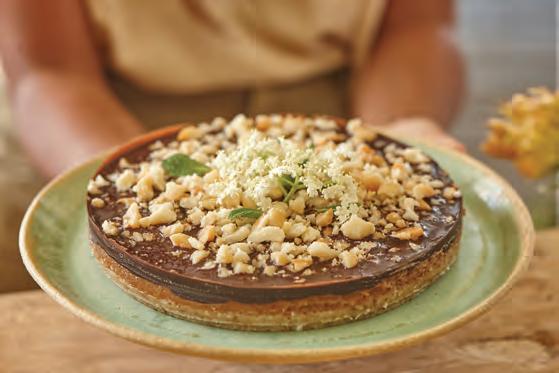
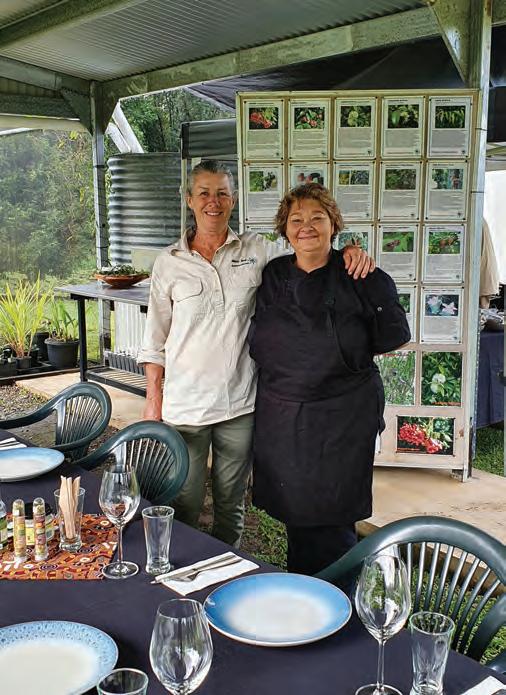
A delicious Dale Chapman creation
a positive force in bridging the gap between non-Indigenous and Indigenous people through food and cultural appreciation. She is an author, an advocate, a teacher and a forager. Her aim is to bring awareness of the oldest living culture in the world – the Australian Aboriginal culture – to educate the national and international community to take positive steps towards reconciliation, and she does so by dishing up the colourful, organic tastes of her people.
Food, after all, is the language of love.
On the day we speak, Aunty Dale is at home. She has lived and worked on Gubbi Gubbi/Kabi Kabi land – also known as the Sunshine Coast – since 1976. Her lush green garden surrounding her Pomona home is “small” by her standards, but brimming with goodness.
“We’ve got avocado, bananas, mangoes, as well as the natives,” she says. “They can all grow really well together, and that’s my analogy; we can all grow together as people.”
As an Adjunct Senior Fellow at the University of Queensland, her research and message is shared far and wide. But it is through her day-to-day work at Forest Glen-based business My Dilly Bag that the real magic happens.
It has been 21 years since she made the life-changing decision to launch the concept.
“It started out as an inkling,” Aunty Dale recalls. “I was a chef by trade and I love bush tucker. I love how I can blend the two things together.”
Her fi rst foray into the new venture brought 50 women together. They sat enthralled as the proud Indigenous woman shared her knowledge about bushfood. It was a light-bulb moment. “I realised people like listening to what I have to say. The feedback from that day was ‘where can I get that product?’”
And so, My Dilly Bag expanded to stock an in-store and online range of Aunty Dale’s own bush tucker jams, chutneys, sauces and herbs. The COVID-19 pandemic brought another boost to business as people were reminded of the importance of getting back to basics.
“Really, it’s what sustained Indigenous people for hundreds of thousands of years – these food practices and culture.
“I have built my own supply team and get a lot of supply from Indigenous and non-Indigenous business throughout Queensland and New South Wales. We have cooking sauces, oils, all the different spice blends. I work with other First Nation businesses and stock their product as well. I work with a lot of women.
“Women always collected 95 per cent of what came into the camp. The men hunted, but the women, when you think about it, gathered. They brought in all the wattleseed, the fruits.”
Aunty Dale also sources native local produce for her creations and bush tucker education workshops from right here on the Sunshine Coast. She works closely with the founder of Witjuti Grub Bushfood Nursery, “whitefella” Veronica Cougan.
Veronica fi rst discovered the abundance of native food while studying a Certifi cate IV in Horticulture at the Nambour TAFE campus 25 years ago. Growing up in a family who favoured native
plants, it seemed like a natural fi t for the Sunshine Coast woman.
“I was blown away and couldn’t believe we had all these edible, unique fl avours and really stunning garden specimens,” she tells salt. “It shocked me that I knew nothing about it, and that no one I knew talked about it. Why haven’t we grown up with these plants, with this food? Why aren’t they in our gardens, in our supermarkets? How much healthier would we all be if we used the native fruits and food that were given to our country?”
This is the message Aunty Dale and Veronica share during their Drive Yourself long table tour – a feast for the senses, and the soul.
Participants gather together at Witjuti Grub and are taken on a guided foraging walk through the three-and-a-half hectare farm as Aunty Dale yarns about the benefi ts and history of beautiful natives such as fi nger limes, Queensland Davidson’s plum, curry myrtle, native turmeric, native peppermint and small-leaf tamarind.
The workshops aim to educate all people about how easy it is to respectfully incorporate native fl avours and textures into their lives. Participants are taken on a culinary journey as they listen to Aunty Dale’s tales.
The table is laden with her creations – a bush spice and native pepper butter bean hommus and a warrigal greens and anise myrtle damper, which boasts a “lovely earthy liquorice fl avour”, served with a nutty macadamia butter. There are tastings of bush tomato relish, spice-rubbed kangaroo kofta, coconut lemon myrtle-rubbed chicken, spiced baked sweet potato and a vibrant and delicious wild grain salad overfl owing with rose apples pickled with radish.
“People don’t realise that this is all around us, in our native environment,” Aunty Dale says. “They come to one of our workshops and that’s when people’s eyes pop open. They didn’t know.”
Hunting and gathering has long been a part of human existence. It is said that for 95 per cent of our time on earth, we humans sustained ourselves through foraging. All over the world, our ancestors survived purely on what Mother Earth delivered
My Dilly Bag PHOTO: Anastasia Kariofyllidis
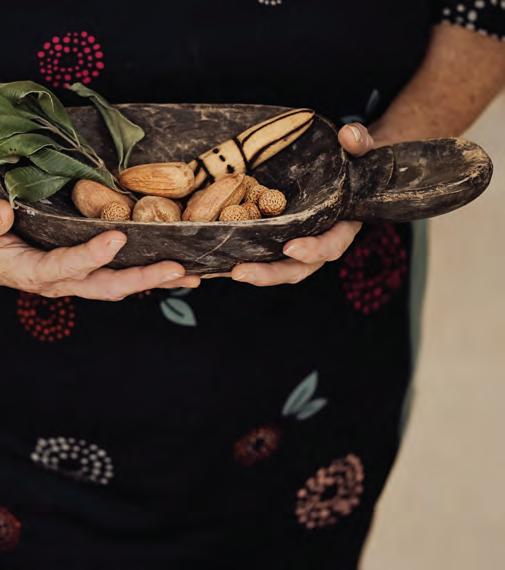
Tropicana Putt Putt
Meet you at the green, because we’re ready to par-tee. Grab a club, collect your ball, and have a tee-riffic time in Centre these School Holidays!
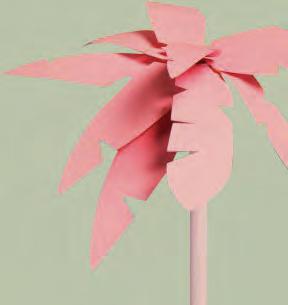
Putt your way through 6 holes, challenged by fruity objects, interesting obstacles and fun props. It’s the best by Par fun you’ll have these holidays with plenty of fun photo opportunities throughout. Dates:Monday 27th June - Saturday 9th July Times:9.30am - 1.30pm daily Cost:Gold Coin Donation to Wishlist
Visit noosacivic.com.au for more information.
1
P UT T P UT T

Witjuti Grub Nursery

– seasonal food designed to sustain life through specifi c months.
“All of the gorgeous foods that we have around now are those citrus plants, which are high in vitamin C and high in antioxidants,” Aunty Dale explains. “That’s why they are here growing now. These beautiful plants suit this cooler climate. Winter comes and the land knows we need that vitamin C.”
The appreciation and understanding of foraging runs deep in Aunty Dale’s veins. “We didn’t even realise that is what we were doing when we were kids walking around gathering this fruit and that fruit. We were brought up on it, and then as I got older, I learnt how to use different cooking methods to get what I want out of an ingredient.
“I learnt just from talking to our people, sitting down and having those wonderful conversations with First Nation elders. I feel a connection to my people when eating bushfood.”
For Indigenous Australians it is not simply about survival, but sustainability and respect for Country.
“Foraging is wonderful. When I go out with a couple of the mob, I’m totting along, having a yarn and I think ‘our people did this for generations and generations’. It’s very exciting to walk along and fi nd things growing. I can’t help myself in every park, looking around, on the ground and up in the trees looking for food.”
She adds, “There are natural indicators out there. When the yellow fl ower of the cotton wood tree are blooming on the beaches, it means mullet is running. This is when you get to fi sh and after that [fl owering and pollination], you stop because it means the mullet need to spawn and produce babies. It shows respect for the land. To have plants and animals next season, we need to understand the life cycle.”

RIGHTFUL RECOGNITION As the Queensland representative for the First Nations Bushfood & Botanical Alliance Australia, Aunty Dale Chapman is on a mission to ensure Indigenous communities are rightfully compensated and acknowledged for their input into products sold by external businesses. The advocacy and economic development alliance was formed to address issues facing the thriving bushfood sector. Currently, Indigenous Australians represent less than two per cent of providers in the industry. There are no regulations in place stipulating that companies must acknowledge communities they source product from, or their cultural influence. “The main thing we want is for when people learn something, we want them to share and acknowledge where it came from,” Aunty Dale says. “It’s important for that person and their relationship to their land. This is what the alliance is set up for, to advocate and lobby local, state and federal governments to help Indigenous people take the next step in producing high-quality standards of food. The aim is to see that percentage [of Indigenous businesses] lift ed. Half of these communities aren’t being compensated correctly. Companies are using their practices and product for their multimillion-dollar businesses. If you really want to sell your product as an Indigenous brand, then we need some sort of authentication certificate or acknowledgement. Then profits and all of those other things can come into play. The general public don’t realise that these things are not already in place.”
My Dilly Bag
TRADITIONAL TUCKER To experience true bushfood and expand your understanding of the culture, check out these following Sunshine Coast businesses. • My Dilly Bag, Monday to Saturday, 9am to 3.30pm, 354 Mons
Road, Forest Glen, mydillybag.com.au • Witjuti Grub Bushfood Nursery has more than 40 diff erent species available to buy. Open by appointment, 84 Falls Creek
Road, Obi Obi, witjutigrub.com.au • Deadly Espresso is a social enterprise with various coff ee locations including one at Noosa, Peregian and Cooroy. Visit @DeadlyEspresso on Facebook for details. • Family-owned Triballink is based at Mapleton and hosts cultural awareness workshops, training and education programs, and Aboriginal dance and dinner events. Visit triballink.com.au










